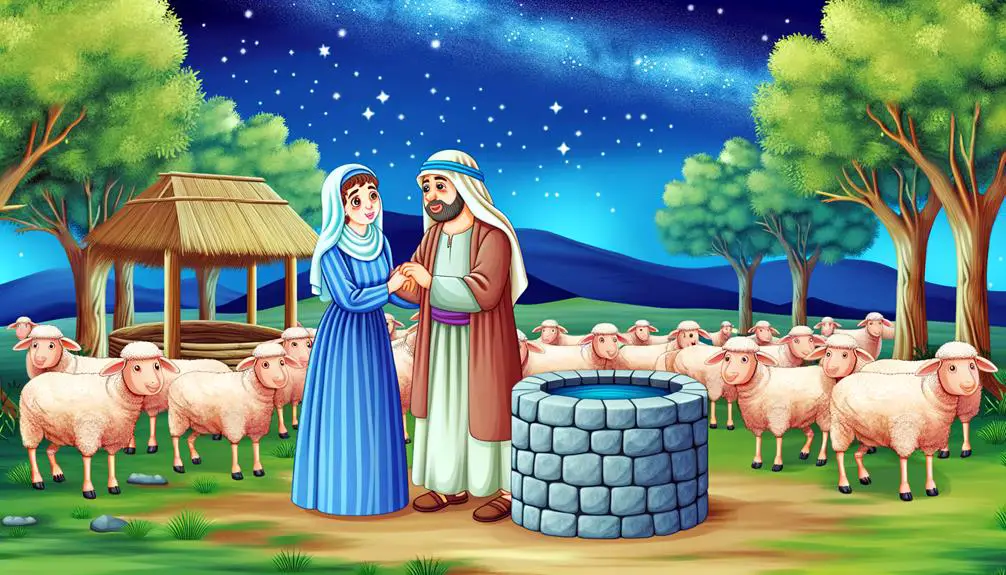Immerse yourself in the tales of biblical names starting with 'R' and discover the profound lessons hidden within their stories.

Names in the Bible Starting With R
You might not be aware, but names starting with 'R' in the Bible hold profound narratives that span from unwavering loyalty to transcendent healing.
Take Ruth, for instance, whose story of devotion sets a precedent for faithfulness beyond familial ties.
Then there's Reuben, whose tale as the firstborn intertwines with themes of inheritance and loss.
Each name starting with 'R' opens a gateway to exploring deeper spiritual and moral lessons.
As we explore these stories together, you'll find yourself immersed in a journey through time, uncovering the richness of biblical lore that still resonates today.
Why not join in uncovering the layers behind these names?
Key Takeaways
- Biblical names starting with 'R' represent themes of loyalty, resilience, and faithfulness.
- Figures like Rachel, Rahab, and Reuben impact destiny and showcase divine intervention.
- Stories of transformation and legacy are central to characters such as Rebekah and Ruth.
- Symbolism, like the scarlet cord in Rahab's narrative, highlights salvation and faith legacies.
Ruth: A Story of Loyalty

Ruth's narrative, often celebrated for its profound demonstration of loyalty, intricately explores the complexities of devotion and kinship within a historical and theological context. This text provides a rich tapestry for analysis, particularly in how it intertwines the themes of harvest celebration and marital strategy. You'll find that the setting during the barley harvest isn't just a backdrop but a pivotal element that propels the narrative forward, underscoring the providence and timing in Ruth's story.
The harvest celebration, a time of joy and abundance, symbolizes new beginnings and the restoration of hope. It's within this context that Ruth's unwavering loyalty to Naomi, her mother-in-law, shines brightest. You see, her decision to glean in Boaz's field, an act of survival, transforms into a strategic move within the marital framework of the time. This isn't merely about sustenance; it's a calculated effort to secure a future within the bounds of familial loyalty and societal norms.
Ruth's approach to Boaz during the harvest celebration is emblematic of her understanding and use of marital strategy. Her actions, guided by Naomi's counsel, are deliberate and respectful, embodying the virtue of loyalty not just in word but in deed. This marital strategy, deeply embedded in the cultural and legal practices of the time, showcases Ruth's wisdom and agency. It's a powerful testament to her character, illustrating how loyalty and strategy aren't mutually exclusive but can coexist, leading to redemption and the continuation of lineage.
In essence, Ruth's story is a masterclass in navigating the complexities of loyalty, kinship, and societal expectations. It teaches you that true loyalty involves sacrifice, strategy, and the hope for renewal, all woven into the fabric of daily life and communal celebrations.
Reuben: The Firstborn's Tale

As we delve into the tale of Reuben, the firstborn of Jacob, we encounter a narrative steeped in complexity and fraught with implications for familial and tribal dynamics within the biblical context. Reuben's story is emblematic of the intricate relational threads that weave through the Old Testament, particularly around themes of sibling rivalry and the significance of birthright.
Reuben's life offers a rich tapestry for analysis, especially when considering:
- Sibling Rivalry: His interactions with his brothers, especially Joseph, underscore the intense competition and jealousy that can exist within a family. Reuben's attempt to save Joseph from their brothers' wrath reflects a complex interplay of guilt, responsibility, and the desire to uphold certain familial duties.
- Birthright Significance: As the firstborn, Reuben was entitled to privileges and a status that were later jeopardized by his own actions. His loss of the birthright over an indiscretion symbolizes the fragility of social and familial standing in biblical narratives.
- Leadership and Responsibility: Despite his shortcomings, Reuben's attempts at mediating conflicts among his siblings highlight themes of leadership and the burdens that come with it.
- Moral and Ethical Dilemmas: His story is rife with moral complexities, showcasing the challenges of navigating right and wrong within the context of family loyalty and societal norms.
Reuben's narrative, while often overshadowed by the stories of his younger siblings, offers invaluable insights into the dynamics of power, responsibility, and redemption in biblical families. Through his tale, we gain a deeper understanding of the nuanced ways in which individual actions can echo through generations, shaping the destinies of entire tribes and the biblical history at large.
Rachel: Love's Endurance

You'll find that Rachel's narrative in the Bible exemplifies a profound journey of love, marked by its depth, resilience against trials, and a lasting legacy of faithfulness.
Her story, intertwined with Jacob's, showcases how enduring adversities together can fortify a relationship's foundation, offering insights into the complexities of biblical love stories.
This exploration into Rachel's life invites a deeper understanding of how love's endurance is celebrated and memorialized in religious texts, emphasizing the significance of her contributions to biblical history.
Rachel's Deep Love
Rachel's profound affection for Jacob epitomizes the endurance of love, even in the face of prolonged separation and adversity. This narrative isn't just a testament to romantic devotion but also underscores Rachel's profound maternal desires, which are inherently linked to her love for Jacob. Her journey reflects an intense emotional landscape, marked by:
- Jacob's unwavering devotion: Despite the years and obstacles, his commitment never wanes.
- Maternal yearnings: Rachel's desire for children becomes a poignant aspect of her love story.
- Societal challenges: Navigating the expectations and norms of her time.
- Personal resilience: Rachel's strength in facing emotional and physical trials.
Analyzing Rachel's story through these lenses offers insights into the complexity of her love, illuminating the multifaceted nature of human emotions and relationships in biblical narratives.
Enduring Trials Together
Building on the foundation of Rachel's profound affection and the obstacles she faced, we now explore how enduring trials together further solidifies the bond between Rachel and Jacob, showcasing love's remarkable resilience. Their journey, marked by shared resilience and collective perseverance, exemplifies how overcoming adversity can deepen a relationship.
Aspect |
Impact on Relationship |
|---|---|
Shared Resilience |
Strengthens emotional bonds |
Collective Perseverance |
Fosters mutual support and understanding |
Overcoming Adversity |
Enhances trust and commitment |
Deepened Relationship |
Results in a more profound connection |
This analytical examination underscores the significance of their shared struggles, not only in fortifying their bond but also in illustrating the indomitable spirit of love through collective perseverance.
Legacy of Faithfulness
Examining the legacy of faithfulness within the context of Rachel's enduring love reveals how steadfast commitment becomes a beacon of hope and resilience in relationships. Rachel's narrative isn't just a love story; it's a testament to the power of faithfulness that echoes through religious heritage. Her devotion, amidst trials, illuminates the path for faithful generations, showcasing resilience in the face of adversity, dedication to loved ones transcending challenges, influence on future familial and spiritual bonds, and contribution to a legacy of faith and love.
This analytical exploration underscores Rachel's role in nurturing a lineage that cherishes faithfulness. Her story, deeply entrenched in history, serves as a cornerstone for understanding the impact of unwavering love and commitment on shaping religious heritage and guiding faithful generations.
Rahab: A Harlot's Faith

You'll find Rahab's narrative compelling, as it showcases a profound transformation through her courageous choice to assist the Israelite spies.
Her actions not only signify a pivotal moment in biblical history but also foreground the complexity of her faith, which emerged despite her profession as a harlot.
Analyzing Rahab's story, you'll uncover the enduring legacy of her faith, illustrating how her singular decision reverberates through generations, challenging traditional views of morality and divine favor.
Rahab's Courageous Choice
Rahab's decision to shelter the Israelite spies in Jericho was a pivotal act of faith, demonstrating her belief in God's sovereignty despite her profession as a harlot. Her courageous choice not only altered the course of her life but also played a critical role in the eventual fall of Jericho.
Consider the following points:
- The strategic importance of Rahab's house, positioned on the city wall, for the spy encounter.
- Her astute negotiation for her family's safety in exchange for her assistance.
- Rahab's explicit expression of faith in the God of Israel, acknowledging His power over Jericho's fall.
- The symbolism of the scarlet cord, marking her house for the Israelite invaders as a sign of her pact.
Rahab's actions underscore a profound faith and strategic acumen, marking her as a key figure in the biblical narrative.
Legacy of Rahab's Faith
Building on Rahab's courageous choice, it's crucial to explore how her unwavering faith left an enduring legacy that transcends her time in Jericho. The scarlet symbol, a red cord she let hang from her window, not only signified her pact with Israelite spies but also became an emblem of salvation and faith across generations.
Her decision to hide the spies, driven by her belief in God's power, directly contributed to Jericho's fall, showcasing the potent intersection of faith and action. Rahab's story, marked by a transition from a harlot to a figure of righteous faith, underscores the transformative power of belief.
Her lineage, intertwining with the genealogy of Jesus, amplifies the significance of her faith, illustrating a lineage redeemed and sanctified through unwavering trust in God's promises.
Rebekah: Mother of Nations

Among the pivotal figures in biblical narratives, Rebekah stands out as a matriarch whose actions and decisions significantly shaped the lineage of nations. As Isaac's wife, she played a central role not just in her family but in the unfolding story of the Jewish people. Her life was marked by moments of profound faith and complex intrigue, most notably in the orchestration of Esau's conflict with his brother Jacob.
To truly appreciate Rebekah's impact, consider the following aspects of her story:
- Her Role in the Covenant: Rebekah was instrumental in ensuring that Isaac's lineage continued through Jacob, despite Esau being the firstborn. This decision had far-reaching implications for the establishment of the Israelite tribes.
- The Divine Oracle: Even before her twins were born, Rebekah sought God's counsel, learning that two nations were in her womb and that the older would serve the younger, a prophecy that shaped her actions.
- Resourcefulness and Strategy: Rebekah's ingenious plan to secure Isaac's blessing for Jacob, favoring him over Esau, showcases her strategic mind and her unwavering commitment to what she believed was a divinely mandated outcome.
- Legacy of Faith: Despite the ethical dilemmas her story presents, Rebekah is remembered as a matriarch who navigated her family through pivotal moments, her faith guiding her actions.
Rebekah's narrative invites a scholarly examination of the complexities of faith, prophecy, and destiny in biblical texts. Her story is a testament to the influential roles women played in the foundational stories of the Bible, shaping not just familial destinies but the course of entire nations.
Raphael: The Healing Angel

Raphael, often identified as the healing angel within biblical traditions, plays a crucial role in both theological narratives and the personal spiritual journeys of countless believers. Central to angel lore, Raphael's name means "God heals" or "He who heals," encapsulating the essence of divine healing. This angelic figure is not just a symbol of health and recovery; he embodies the profound connection between the divine will and the physical and emotional well-being of humanity.
In the study of Raphael, you'll encounter a rich tapestry of interpretations and roles that transcend mere mythological characterizations. His presence signifies a direct intervention by the divine in the mortal realm, offering solace and healing to those in need. The following table outlines key aspects of Raphael's identity and mission:
Attribute |
Significance |
Biblical References |
|---|---|---|
Name Meaning |
"God heals" or "He who heals" |
– |
Role |
Healing, guidance, protection |
Tobit 12:15 |
Symbolism |
Fish, staff, jug of oil |
– |
Representation |
Archangel, protector, healer |
– |
This table encapsulates the multifaceted nature of Raphael, highlighting his integral role in divine healing and protection. It's crucial to approach his story with a scholarly lens, appreciating the depth and complexity Raphael adds to angel lore. His narrative is not just a tale of miraculous intervention but a reflection of the ongoing relationship between the divine and the human, emphasizing hope, healing, and guidance.
Frequently Asked Questions
How Did the Cultural and Historical Context of the Time Influence the Meanings and Significance of Names Starting With 'R' in the Bible?
You'll find that the cultural and historical context heavily influenced names' meanings and significance. Roman influence and naming conventions of the time played pivotal roles. Romans, with their vast empire, impacted many aspects of daily life, including how people were named.
Naming conventions, deeply rooted in traditions and beliefs, reflected an individual's societal status, lineage, and religious affiliations. These elements combined to imbue names with rich layers of meaning and significance, shaping their lasting legacy.
Are There Any Lesser-Known Biblical Figures With Names Starting With 'R' Whose Stories Offer Unique Insights or Moral Lessons?
You're diving into an ocean of stories, seeking pearls of wisdom from less-celebrated biblical figures. Rahab's bravery, not just a footnote, teaches the power of courage and faith in the most dire situations.
Meanwhile, Reuben's dilemma offers a complex lesson on decision-making and the consequences of inaction.
Analyzing these narratives, you uncover layers of moral and ethical teachings, demonstrating that even the lesser-known can shine a light on profound truths.
How Have Names Starting With 'R' From the Bible Been Adapted or Changed in Their Usage in Different Cultures and Languages Over Time?
When you delve into R name etymology, you'll discover that these names have undergone fascinating transformations across cultures. Regional name variations highlight how languages adapt biblical names to fit phonetic and cultural norms.
For example, 'Rebecca' becomes 'Rébecca' in French or 'Rivka' in Hebrew. This evolution reflects not only linguistic shifts but also the deep-rooted influence of biblical narratives on naming conventions worldwide, showcasing a rich tapestry of cultural interchange and adaptation.
Can the Influence of Biblical Names Starting With 'R' Be Seen in Modern Times, and How Do These Names Impact the Identities and Personalities of Those Who Bear Them Today?
Imagine walking through a vibrant tapestry of history, where each thread represents a name, weaving together the past and present.
The evolution of naming traditions has deeply influenced personal identity development, reflecting societal changes and cultural integrations.
Analyzing this intricate web, you'll discover how modern individuals bearing these historically rich names navigate their identities, subtly shaped by their ancestral roots.
This fascinating interplay highlights the enduring impact of names on personal narratives and societal perceptions.
What Are the Common Themes or Characteristics Shared by Individuals With Names Starting With 'R' in the Bible, and How Do These Reflect Broader Biblical Narratives or Teachings?
You'll find that individuals with 'R' names often embody traits of leadership and resilience, reflecting broader themes of role models and redemption narratives in scripture.
This isn't just coincidence; it's a testament to how these stories serve as a blueprint for character development.
Analyzing these names, you'll notice a pattern where qualities like righteousness, courage, and redemption are emphasized, mirroring the biblical teachings that advocate for moral integrity and spiritual growth.
Conclusion
In delving deep into these stories, you've journeyed through tales of undying loyalty, firstborn complexities, enduring love, transformative faith, and monumental motherhood, all while under the watchful gaze of a healing angel.
Isn't it fascinating how names, mere collections of letters, can encapsulate such profound narratives? As you've seen, each character's story not only paints a vivid picture of biblical times but also offers timeless lessons that resonate with the human spirit.
These narratives remind us that within every name lies a story waiting to be told.



Sign up